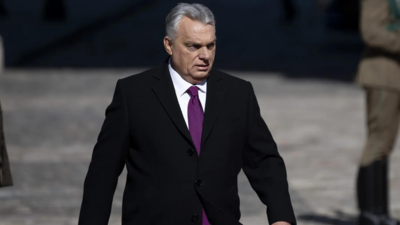
Hungarian Prime Minister Viktor Orban (AP)
The video clip shows investigators, fingerprints, crime scene photos, a drug lab and bullet casings, then the head of a black wolf looking maliciously into the camera. A man speaks in a deep, menacing voice: "Drug and arms trafficking is the specialty of the Ukrainian mafia.
Their mercilessness is notorious worldwide. The war has brought more weapons into their hands than ever before."A tank rolls across the screen, a man puts on a balaclava, then there's a photo of EU Commission President Ursula von der Leyen. "Brussels is playing with fire," the voice continues. "If Ukraine joins the EU, the Ukrainian mafia will come to Hungary unhindered."This and similar clips are currently all over Hungary's pro-government media platforms. They're part of a campaign recently launched by Hungarian Prime Minister Viktor Orban against Ukraine's EU accession process.All Hungarian citizens have until June 20 to vote on whether they are for or against Ukraine joining the EU. Hungary's government is, not surprisingly, against it.Orban has been on a pro-Russian and anti-Ukrainian course for years. But recently, the sharpness of his tone and the bluntness of his language against Ukraine have been on the rise. His current campaign tops any of his previous smear and defamation campaigns by far, and that includes his controversial national consultations stoking anti-immigrant sentiments, or his antisemitic attacks against the billionaire George Soros.
These are propaganda lies that are as shocking as they are racist. The neighboring country is portrayed as the "center of drug trafficking and organized crime in Eastern Europe," as a mass of barbaric people who either belong to the mafia or are waiting to flood Hungary with their "cheap labor" and collect Hungarian pensions. If Ukraine were a member of the EU, one text from the campaign claimed, public security and the health system in Hungary would collapse.Brussels, meanwhile, as the heart of the EU, is portrayed as the one pulling the strings. Why is Orban taking aim at Ukraine?As absurd as all this sounds, the background to the campaign is easy to explain. All in all, it boils down to Hungarian domestic politics.In Hungary, Orban fatigue has spread among the majority of the population, also encouraged by corruption and a disregard for the rule of law on the part of Orban himself, as well as his family and his inner circle.Opposition leader Peter Magyar, the first serious challenger for prime minister in a long time, is by far the most popular politician in the polls. His Respect and Freedom (Tisza) party is well ahead of Orban's Hungarian Civic Alliance (Fidesz) party.Parliamentary elections are set for next spring. As things stand at present, Orban could lose, and subsequently face investigation proceedings and imprisonment for corruption and abuse of office.Against this backdrop, the prime minister and his government have long been trying to find a way to discredit Magyar. Recently, Ukraine has presented itself as an opportunity. But when Orban vaguely announced the current anti-Ukrainian campaign in March, Magyar got moving to respond, and fast.Thousands of volunteers from the Tizsa party gathered opinions in every Hungarian town and municipality on a range of issues, including Ukrainian membership of the EU.
The result was probably surprising even for Magyar: In total, 58%of Hungarians supported Ukraine's bid to join the bloc.When this fact became public knowledge, Orban and his government did not accuse the Tisza party of lying, instead they came up with the narrative for the current campaign.It put out messages about "war-mongering Brussels," which, it said, finances Ukraine and, together with Ukrainian President Volodymyr Zelenskyy, "bought" the Tisza party in order to overthrow the "national, pro-Hungarian peace government" in Hungary and bring a "pro-Ukrainian, anti-national war party" to power.In reality, Magyar and his party are hardly enthusiastic supporters of Ukraine. It's unclear to what extent Orban's campaign will have an impact beyond his very tight-knit camp of supporters.Orban has dreams of turning back the clockBeyond this, the prime minister's anti-Ukrainian stance serves the nostalgic revisionist sentiments of his own and other far-right voters in Hungary, who dream of Transcarpathia, a historical region on the border between Central and Eastern Europe, becoming part of the Hungarian state.
Parts of this western Ukrainian region belonged to Austria-Hungary before World War I.In his speeches, Orban repeatedly invokes the "unity of all Hungarians" and at the same time speaks of Ukraine as a "no man's land" or an "area called Ukraine", deliberately hinting at a possible fragmentation of Ukrainian territory.In terms of foreign policy, Orban's anti-Ukrainian stance can also be interpreted as a declaration of loyalty to Russian President Vladimir Putin and US President Donald Trump.
Good relations with Putin play a particularly important role for Orban, as he has tied Hungary to Russia, both economically and financially.Hungary's bid to protect Russian oligarchsWhile Orban and his government portray Ukraine as a corrupt mafia state, they have repeatedly protected Russian oligarchs who have links to organized crime and are included on EU sanctions lists for war crimes. Orban's government, for example, sought to have oligarchs such as Alisher Usmanov or Mikhail Fridman removed from the EU sanctions lists.As far as the alleged mafia state of Ukraine is concerned, experts, for example, from the Organization for Economic Cooperation in Europe, agree that the rule of law is far more established there than in Hungary. It says a fight against corruption is being waged successfully even during the ongoing war. That contrasts with Hungary, where there are no visible steps in this direction.

 3 weeks ago
13
3 weeks ago
13









 English (US) ·
English (US) ·